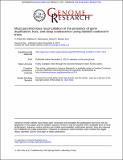Most parsimonious reconciliation in the presence of gene duplication, loss, and deep coalescence using labeled coalescent trees
Author(s)
Wu, Yi-Chieh; Bansal, Mukul S.; Kellis, Manolis; Rasmussen, Matthew D.
DownloadWu-2013-Most parsimonious re.pdf (1.042Mb)
PUBLISHER_CC
Publisher with Creative Commons License
Creative Commons Attribution
Terms of use
Metadata
Show full item recordAbstract
Accurate gene tree-species tree reconciliation is fundamental to inferring the evolutionary history of a gene family. However, although it has long been appreciated that population-related effects such as incomplete lineage sorting (ILS) can dramatically affect the gene tree, many of the most popular reconciliation methods consider discordance only due to gene duplication and loss (and sometimes horizontal gene transfer). Methods that do model ILS are either highly parameterized or consider a restricted set of histories, thus limiting their applicability and accuracy. To address these challenges, we present a novel algorithm DLCpar for inferring a most parsimonious (MP) history of a gene family in the presence of duplications, losses, and ILS. Our algorithm relies on a new reconciliation structure, the labeled coalescent tree (LCT), that simultaneously describes coalescent and duplication-loss history. We show that the LCT representation enables an exhaustive and efficient search over the space of reconciliations, and, for most gene families, the least common ancestor (LCA) mapping is an optimal solution for the species mapping between the gene tree and species tree in an MP LCT. Applying our algorithm to a variety of clades, including flies, fungi, and primates, as well as to simulated phylogenies, we achieve high accuracy, comparable to sophisticated probabilistic reconciliation methods, at reduced run time and with far fewer parameters. These properties enable inferences of the complex evolution of gene families across a broad range of species and large data sets.
Date issued
2013-12Department
Massachusetts Institute of Technology. Computer Science and Artificial Intelligence Laboratory; Massachusetts Institute of Technology. Department of Electrical Engineering and Computer ScienceJournal
Genome Research
Publisher
Cold Spring Harbor Laboratory Press
Citation
Wu, Y.-C., M. D. Rasmussen, M. S. Bansal, and M. Kellis. “Most Parsimonious Reconciliation in the Presence of Gene Duplication, Loss, and Deep Coalescence Using Labeled Coalescent Trees.” Genome Research 24, no. 3 (March 1, 2014): 475–486.
Version: Final published version
ISSN
1088-9051